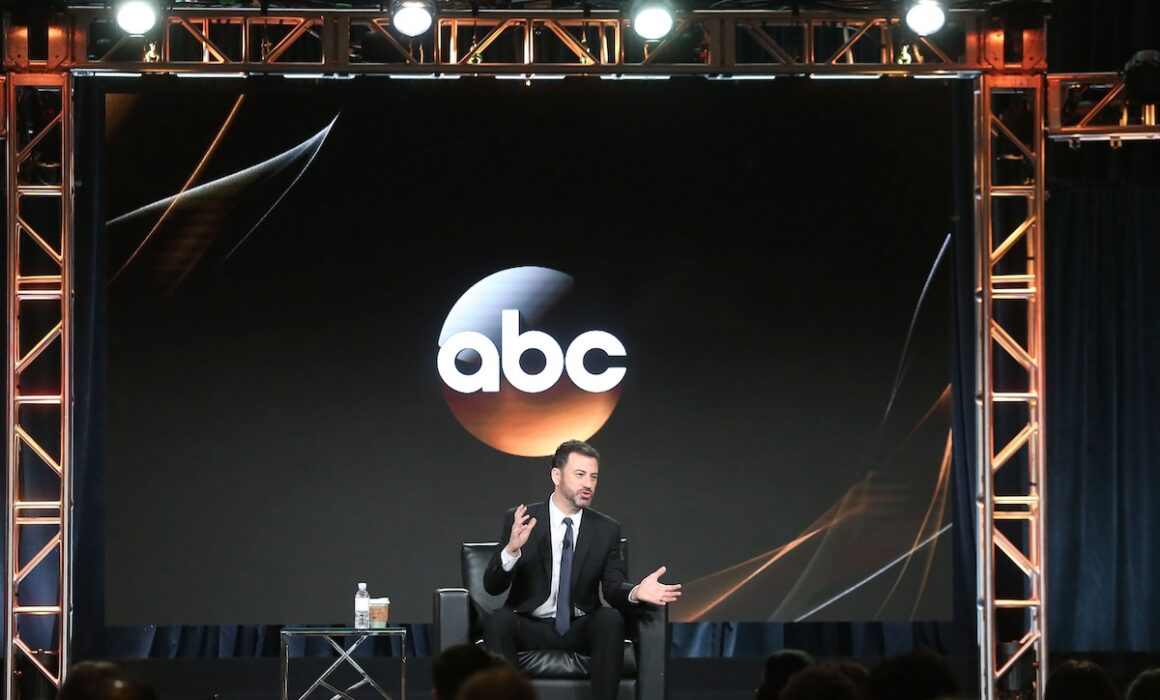The Kimmel Saga Proves Media Consolidation Is a Threat to Democracy
September 27, 2025
Late-night comedy isn’t the only speech under attack.
The Roosevelt Rundown features our top stories of the week.
Jimmy Kimmel speaking in Pasadena, California, in January 2018. (Photo by Frederick M. Brown/Getty Images)
How Corporate Concentration Enables State Censorship
Jimmy Kimmel’s ABC late-night show is back following a whirlwind week: Parent company Disney’s decision to suspend was met with uproar, with many viewers seeing it as capitulation to threats from the Federal Communications Commission (FCC). Still, two large broadcasters—Nexstar and Sinclair—refused to air the program on their networks. In a new blog post, Roosevelt’s Bilal Baydoun explains how we got here, and how the consolidation of hundreds of media companies into just a handful makes our information ecosystem more vulnerable to state bullying.
“Where broadcasting once reflected the decisions of hundreds of independent and often local owners,” Baydoun writes, “a handful of supergroups like Sinclair and Nexstar now dominate.” As it happens, both companies—whose actions blocked roughly a quarter of ABC affiliate stations from airing Kimmel’s return, until Sinclair’s change of heart today—are actively pursuing regulatory approvals or mergers that will require the favor of the FCC. “When a few large owners control access,” Baydoun explains, “the pressure of a regulator’s threat ripples faster across the system.”
The Trump administration has signaled that it may loosen regulations on broadcasters, making the media terrain even more ripe for pressure and censorship. Congress has also stripped funding for the Corporation for Public Broadcasting, reflecting a “broader effort by this administration to dismantle any institutions that might hold it accountable,” Baydoun said in July.
A media ecosystem dominated by a handful of ultra-wealthy decision-makers is a gold mine for a federal government eager to consolidate power and suppress speech it finds distasteful. That’s because “for-profit media conglomerates are accountable first and foremost to their shareholders,” Baydoun writes, “not to the tradition of free speech that is the lifeblood of their industry and American democracy.”
Democracy depends on free discussion among the people. “Public media must be treated as core democratic infrastructure,” Baydoun writes. “At a moment when commercial broadcasters are increasingly beholden to both Wall Street and Washington, a robust public system is one of the few ways to guarantee space for independent journalism and pluralistic debate.”
Read the blog post: Threats to Free Speech Won’t End with Late-Night Comedians
Why Crypto Doesn’t Want to Be a Security
Cryptocurrency companies are nervous about how regulators will treat them. In recent months, the sector has been fighting hard to pass legislation that will allow it to avoid the enforcement and oversight that comes with currencies being classified as securities. That could leave the rest of us at risk, particularly given crypto’s history of enabling crime and fraud.
In two new blog posts, Roosevelt’s Brad Lipton breaks down why it matters how crypto is classified for regulation, the implications of the CLARITY Act, and the risks to investors and the broader economy.
“Crypto is starting to creep into the mainstream,” including in retirement savings, Lipton writes. “If people’s retirement security is on the line, it will be crucially important for crypto investments to be safe and regulated.” He adds that without strict enforcement, “The result could be a massive shift in our economy toward investments in which investors aren’t protected—the same circumstances that literally led to the Great Depression.”
Read the blog posts:
- Comparing Oranges to Onions: What Is Crypto “Market Structure,” and Why Is It Important?
- What Would the New Crypto “Market Structure” Bills Do, and What Dangers Do They Pose?
What We’re Talking About
What We’re Reading
- On women and the cost of living: Women worry more than men about the cost of health care, housing, groceries, and other life expenses, according to a new poll from The 19th.
- As Roosevelt’s Michael Madowitz explained, this is thanks in part to gendered breakdowns in household management, and “the shift in who does all the bill paying over the last generation.”
- On after-school childcare: When school’s out, kids need a safe place to be. But millions of parents who work 9 to 5 struggle to find an after-school or summer option for their children. “What we have isn’t working,” economist Kathryn Anne Edwards told Time Magazine this week. “The solution needs to be bigger.”
- In a June report for the Roosevelt Institute, Edwards outlined a bold plan for finally treating childcare like the public infrastructure it is: Whole Child, Whole Day, Whole Year: Assembling a Comprehensive Child Development System for America



